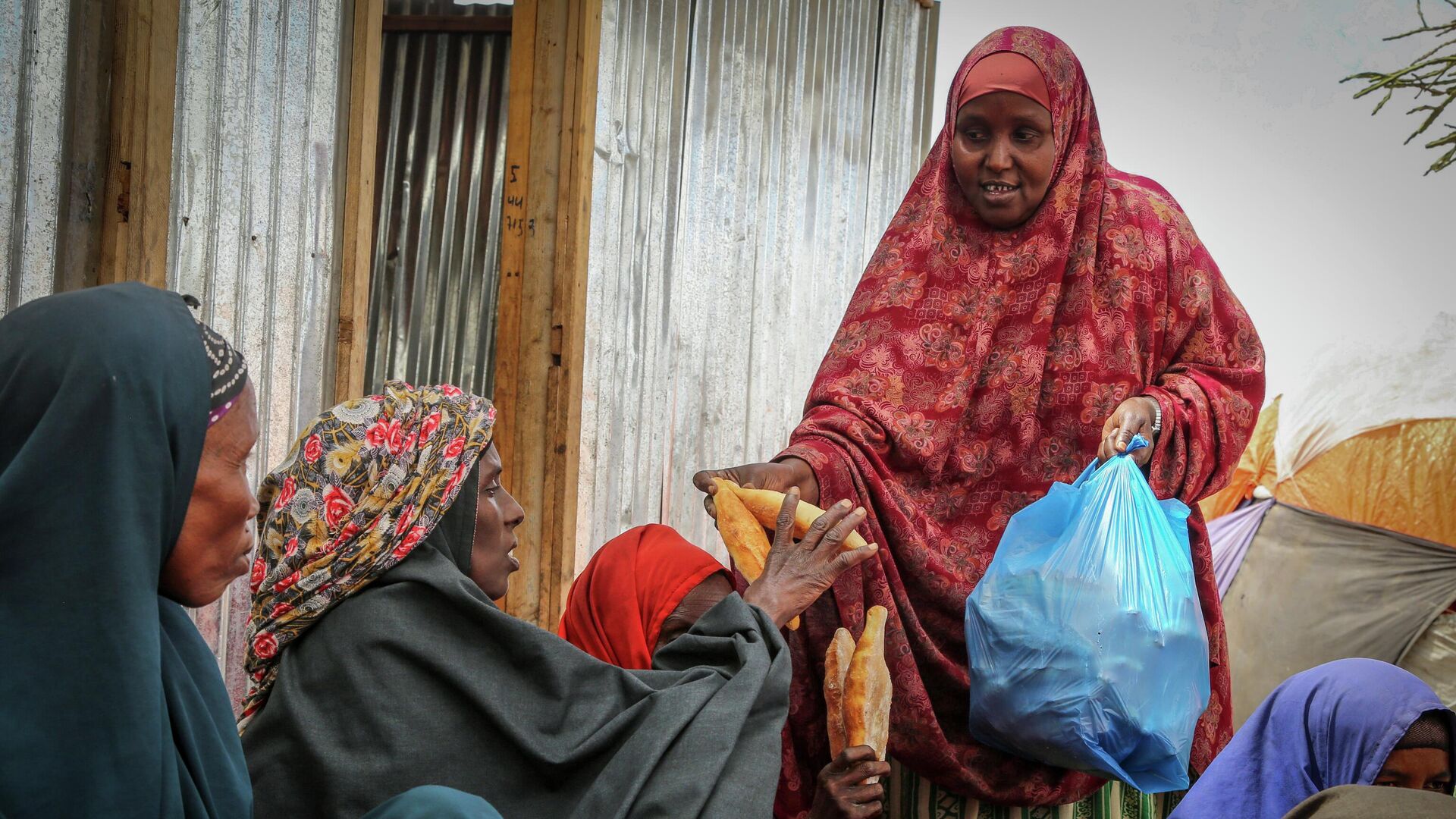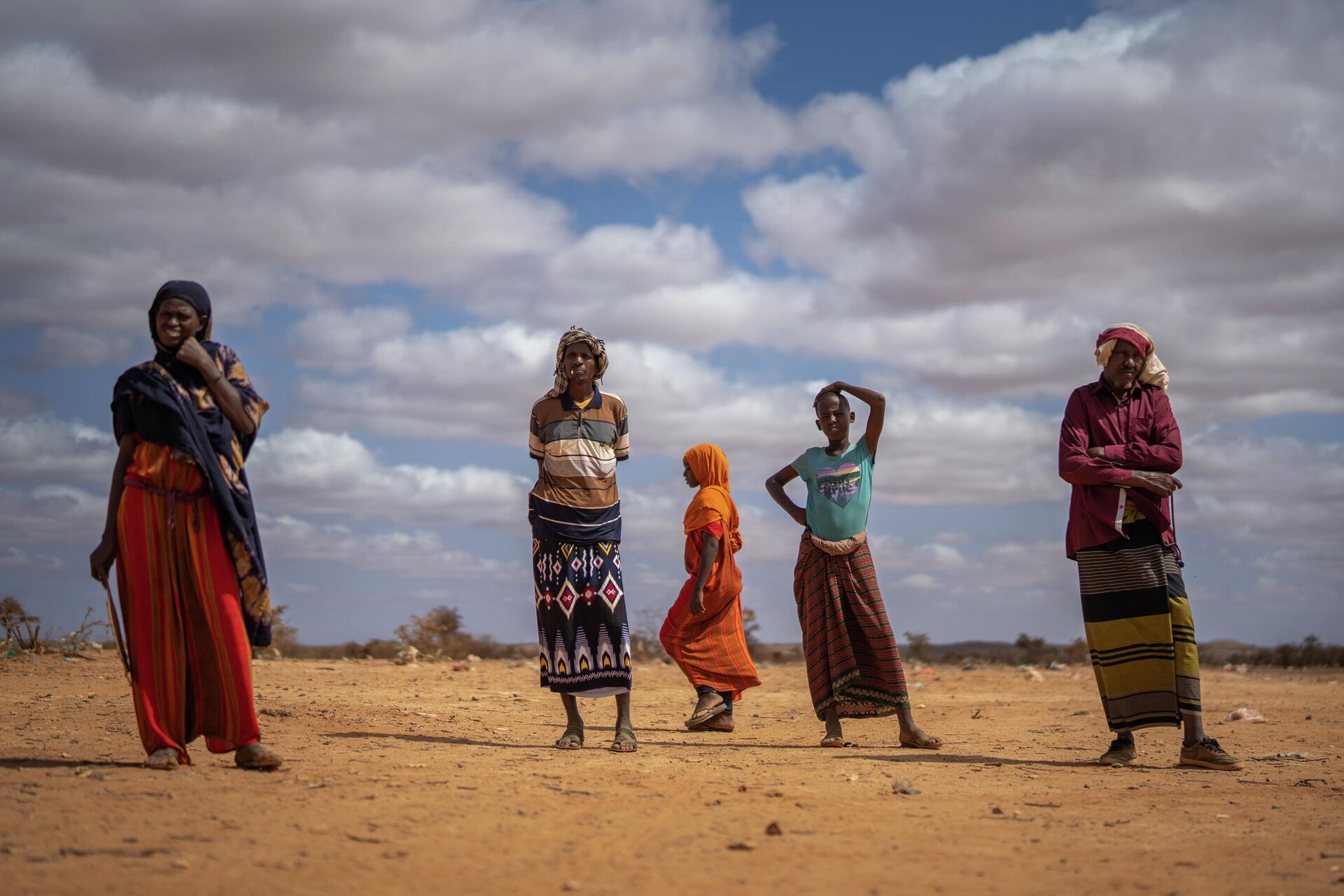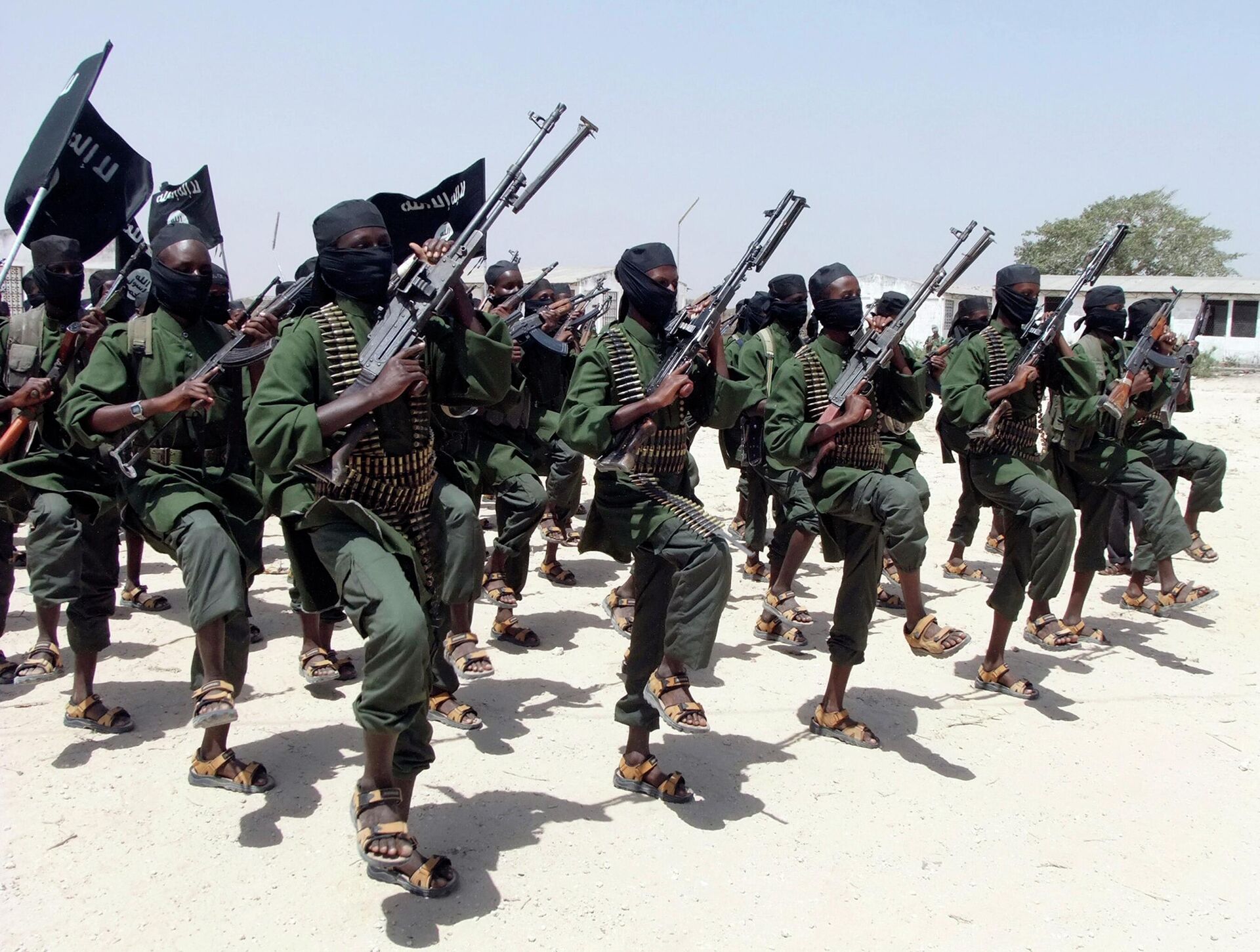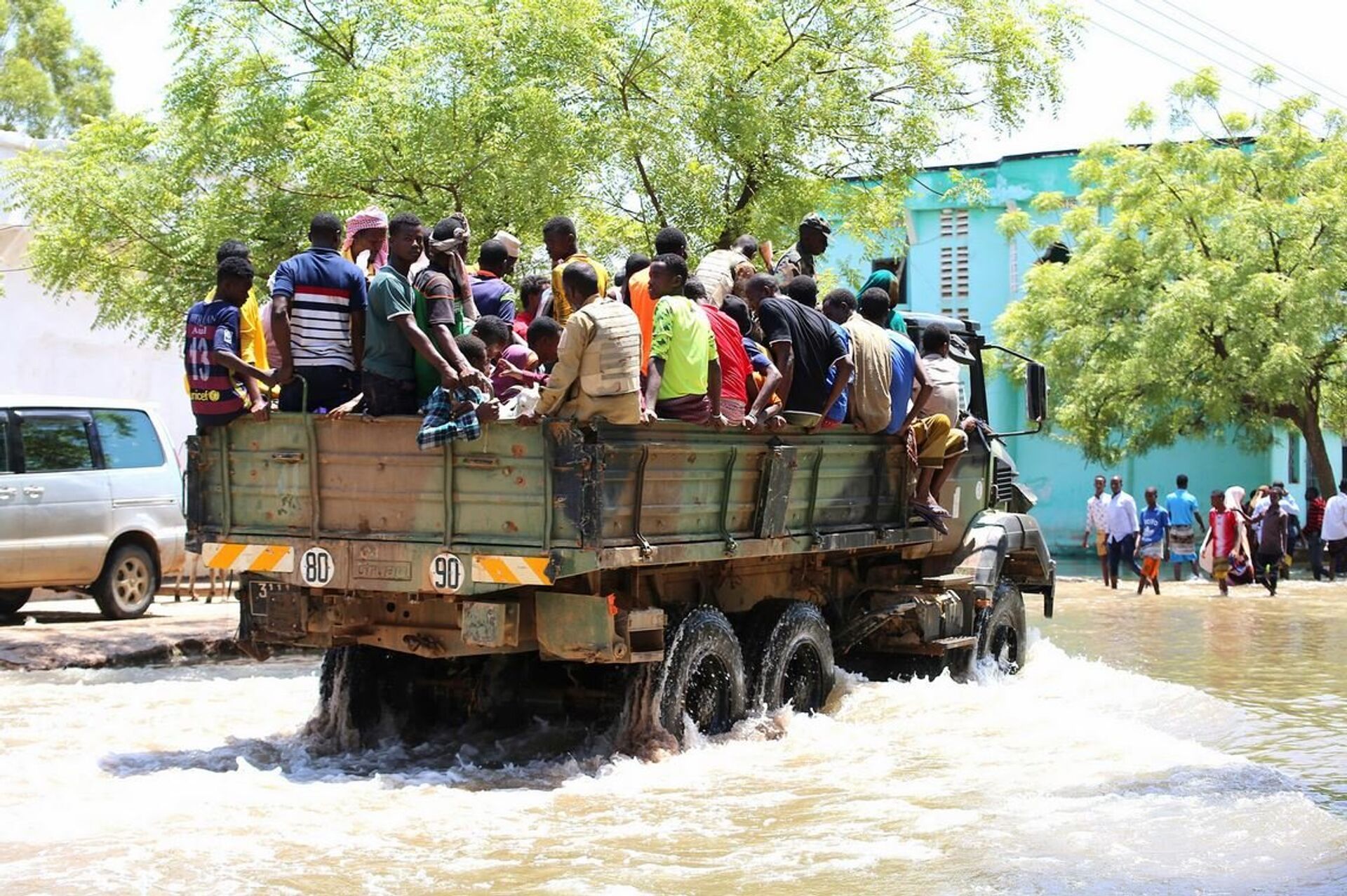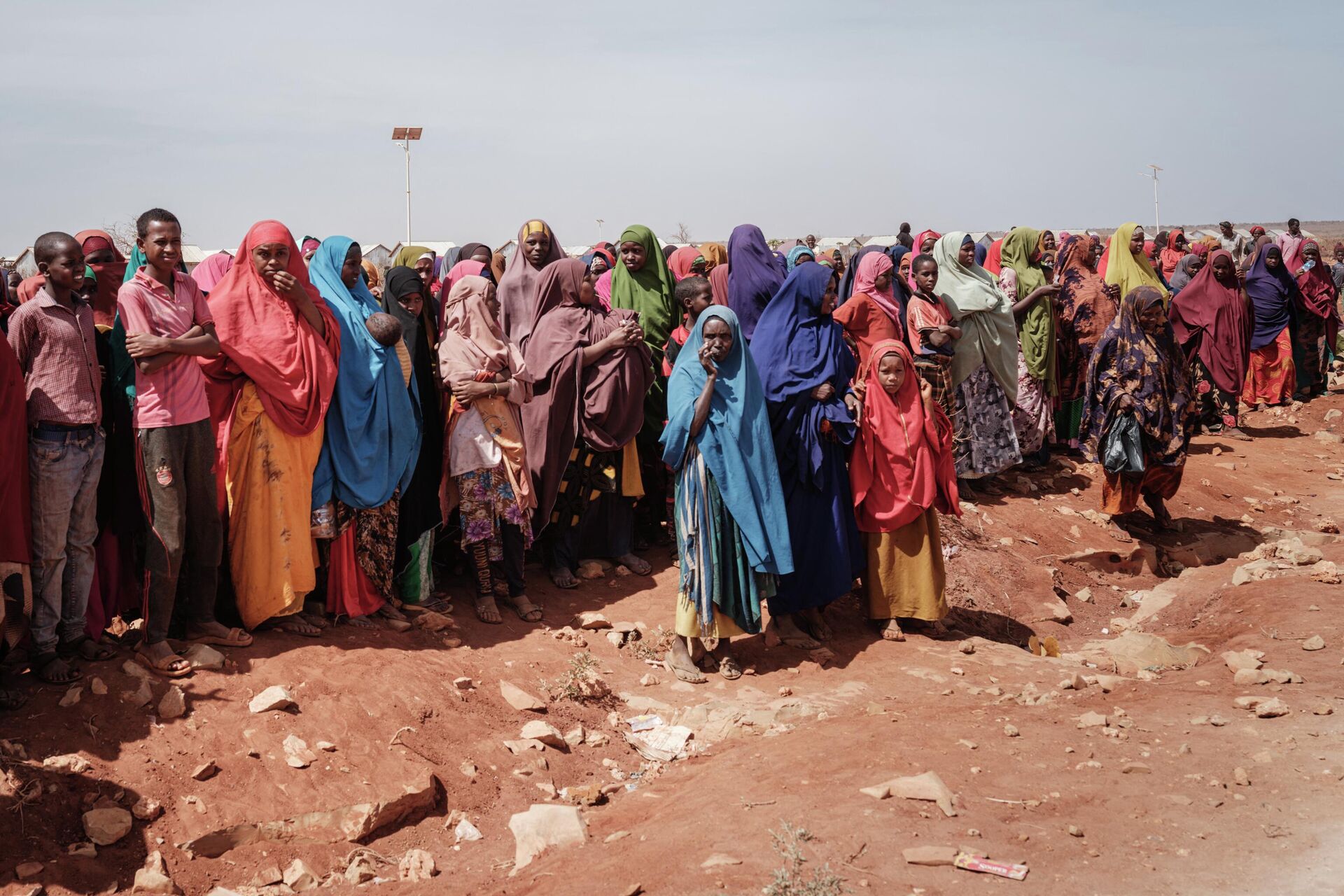https://sputnikglobe.com/20221029/as-floods-and-drought-threaten-somalias-livestock-women-become-khat-traders-1102819187.html
As Floods and Drought Threaten Somalia's Livestock, Women Become Khat Traders
As Floods and Drought Threaten Somalia's Livestock, Women Become Khat Traders
Sputnik International
MOSCOW (Sputnik), Tommy Yang - Facing both natural disasters such as extreme drought and security threats from the instability in the country, activists in... 29.10.2022, Sputnik International
2022-10-29T06:46+0000
2022-10-29T06:46+0000
2023-02-14T14:11+0000
africa
somalia
famine
africa insight
east africa
floods
drought
https://cdn1.img.sputnikglobe.com/img/07e6/0a/1b/1102765817_0:0:3072:1728_1920x0_80_0_0_9e5c9c32d0f568970245a3eec5b231c8.jpg
While Somalia has been struggling with its worst drought in the past 40 years, the city of Qardho, located in the northeastern part of the country, faced an opposite crisis last week when a flash flood raged through it.Koshin explained that this was not the first time this kind of flash flood had disrupted the lives of of the city's residents.To her surprise, Koshin found out that the flash flood was not caused by heavy rainfall in Qardho.Nevertheless, the activist pointed out that flash floods were only a part of the complex problems that Somalia had been struggling with in recent years.Losing Key Source of IncomeAccording to the World Food Program under the United Nations, Somalia is experiencing catastrophic hunger as more than 7.1 million people in the country face acute food insecurities because of the extreme drought in the Horn of Africa.A total of 1.5 million children under 5 face acute malnutrition and more than a million people have been displaced by the drought, the UN agency said.Koshin explained how the drought destroyed the key source of income for many families in Somalia.Never-Ending ConflictIn addition to natural disasters such as drought and floods, the ongoing crisis between the government forces and Islamic jihadist group al-Shabaab* has forced millions of Somalis to flee the conflict zones.According to the latest report from the United Nations High Commissioner for Refugees, over 1.4 million individuals have been internally displaced in Somalia in 2022.As the Somali government tried to step up its efforts in the battle against the al-Shabaab, some local reporters questioned whether certain new restrictions could threaten freedom of expression inside the country.The Federal Government of Somalia issued a new directive on October 8 that prohibited the dissemination of extreme ideology messages through both traditional media broadcasts and social media.However, a number of media associations in Somalia have expressed concerns over the new regulation, which could be used to silence legitimate critics of the government and its security forces.On October 10, Abdalle Ahmed Mumin, the secretary general of the Somali Journalists Syndicate, led a press conference co-organized by four other media associations, namely the Somalia Mechanism for Safety of Journalists, the Federation of Somali Journalists, the Somali Media Association and the Somali Independent Media Houses Association.During the press conference, Mumin detailed the possible negative impact of the new government directive on press freedom and freedom of expression in the country.Unfortunately, Mumin was arrested by Somalia’s Intelligence and Security Agency the next day, when he was traveling to Nairobi through the Aden Adde International airport in Mogadishu.Mohamed Bulbul, the information secretary of the Somali Journalists Syndicate, explained how the government’s new directive could disrupt independent reporting by journalists in the country.In the week following Mumin’s arrest, a number of other journalists were also arrested in various regions in Somalia, according to the Somali Journalists Syndicate.Reporters in Somalia have become one of the most vulnerable groups in the country as they are targeted by both the government and al-Shabaab, Bulbul pointed out.Bulbul has been working as a reporter for Universal Somali TV for over seven years.As for the ongoing crisis, Bulbul does not believe the government forces could defeat the al-Shabaab in the near future.Following a presidential election that had been delayed for more than a year, Hassan Sheikh Mohamud took office as the new president of Somalia in May.Gender Roles Changing Amid CrisisNevertheless, the ongoing humanitarian crisis and security problems in Somalia could become an opportunity for Somali women to transform their roles in the household, Koshin, an activist who has been advocating gender equality, suggested.Somali women’s role in the khat stimulant trade in the country was a good example of this transformation, Koshin added.*A terrorist group outlawed in Russia and many other countries.
africa
somalia
east africa
Sputnik International
feedback@sputniknews.com
+74956456601
MIA „Rossiya Segodnya“
2022
Sputnik International
feedback@sputniknews.com
+74956456601
MIA „Rossiya Segodnya“
News
en_EN
Sputnik International
feedback@sputniknews.com
+74956456601
MIA „Rossiya Segodnya“
Sputnik International
feedback@sputniknews.com
+74956456601
MIA „Rossiya Segodnya“
somalia, famine, africa insight, east africa, floods, drought
somalia, famine, africa insight, east africa, floods, drought
As Floods and Drought Threaten Somalia's Livestock, Women Become Khat Traders
06:46 GMT 29.10.2022 (Updated: 14:11 GMT 14.02.2023) MOSCOW (Sputnik), Tommy Yang - Facing both natural disasters such as extreme drought and security threats from the instability in the country, activists in Somalia shared with Sputnik their devastating impact and how locals have been coping with the crises.
While
Somalia has been struggling with its worst drought in the past 40 years, the city of Qardho, located in the northeastern part of the country, faced an opposite crisis last week when a flash flood raged through it.
"We have issues with the drought, which happens every year because of delayed rains or rains that did not come at all. On top of that, we’re facing the consequences or effects of climate change. We’re seeing more floods in Somalia that we have not seen before. Devastating and destructive floods swept through my hometown of Qardho a few days ago," Sahra Ahmed Koshin, a Somali activist who has been following the nation’s humanitarian crisis closely, told Sputnik.
Koshin explained that this was not the first time this kind of flash flood had disrupted the lives of of the city's residents.
"For example, two years ago, it rained heavily and many lives were lost. We lost livestock, resources, businesses and infrastructure. And in those two years, nothing much was really done to prevent similar losses. In my opinion, there hasn’t been any major flood preparedness activities or mechanisms to be put in place to prevent any potential flash floods," she said.
To her surprise, Koshin found out that the flash flood was not caused by heavy rainfall in Qardho.
"Imagine, this time around, it didn’t rain in Qardho. The flash flood came as a result of rain in nearby villages. Qardho has two major streams running through both sides of the town. If you look at the satellite image of the town, Qardho lies between two streams of water. And because Qardho is located below sea level, the entire town could be easily swallowed by water during flash floods," she said.
Nevertheless, the activist pointed out that flash floods were only a part of the complex problems that Somalia had been struggling with in recent years.
"Somalia is facing a number of challenges all at the same time. It’s a complex crisis. We’ve also been dealing with ongoing inflation. The hunger situation and the drought situation made it more disastrous for families and communities that had already been struggling with the inflation. The war in Ukraine has somehow affected food prices, food availability and food security in Somalia because some of the staple food, like wheat, was imported from that country," she said.
Losing Key Source of Income
According to the World Food Program under the United Nations, Somalia is experiencing catastrophic hunger as more than 7.1 million people in the country face acute food insecurities because of the extreme drought in the Horn of Africa.
A total of 1.5 million children under 5 face acute malnutrition and more than a million people have been
displaced by the drought, the UN agency said.
"Famine could break out in a matter of weeks in some regions if livestock and crops continue to die and soaring prices continue to destroy purchasing power. The last famine declared in Somalia, in 2011, killed a quarter of a million people," the World Food Program warned in its report on the emergency situation in Somalia.
Koshin explained how the drought destroyed the key source of income for many families in Somalia.
"The heart of the Somali economy is livestock. Almost 70% of Somalis are living a nomadic lifestyle. Their whole income and their whole livelihood are based on livestock, such as goats and sheep. When the drought happens, it affects not only people but also the livestock, which were killed in the hundreds of thousands. Somalia exports livestock to countries like Saudi Arabia and many other countries in the Gulf. When Somalia wants to export the livestock, they need to send healthy and nice-looking animals. They can’t send sick animals. This has also impacted our economy greatly," she said.
In addition to natural disasters such as drought and floods, the ongoing crisis between the government forces and Islamic jihadist group al-Shabaab* has
forced millions of Somalis to flee the conflict zones.
According to the latest report from the United Nations High Commissioner for Refugees, over 1.4 million individuals have been internally displaced in Somalia in 2022.
As the Somali government tried to step up its efforts in the battle against the al-Shabaab, some local reporters questioned whether certain new restrictions could threaten freedom of expression inside the country.
The Federal Government of Somalia issued a new directive on October 8 that prohibited the dissemination of extreme ideology messages through both traditional media broadcasts and social media.
However, a number of media associations in Somalia have expressed concerns over the new regulation, which could be used to silence legitimate critics of the government and its security forces.
On October 10, Abdalle Ahmed Mumin, the secretary general of the Somali Journalists Syndicate, led a press conference co-organized by four other media associations, namely the Somalia Mechanism for Safety of Journalists, the Federation of Somali Journalists, the Somali Media Association and the Somali Independent Media Houses Association.
During the press conference, Mumin detailed the possible negative impact of the new government directive on press freedom and freedom of expression in the country.
"The government directive suspended Telegram, which is a cloud-based encrypted instant messaging platform used by many Somalis for sharing information. The complete shutdown of Telegram in the country not only impacts many ordinary Somalis but puts into question the purpose of this restriction," Mumin said.
Unfortunately, Mumin was arrested by Somalia’s Intelligence and Security Agency the next day, when he was traveling to Nairobi through the Aden Adde International airport in Mogadishu.
Mohamed Bulbul, the information secretary of the Somali Journalists Syndicate, explained how the government’s new directive could disrupt independent reporting by journalists in the country.
"For example, the al-Shabaab controls the rural areas in Somalia. Sometimes, they ambush the Somali military forces that were patrolling the outskirts of Mogadishu or other frontlines. But if you try to write a report by saying that the al-Shabaab fighters ambushed the government forces and killed [some soldiers], the government won’t allow you to do this. Or when the government forces and the al-Shabaab fight in the rural areas, you should only say what the government forces did to the al-Shabaab militants, but they can never say anything about what the al-Shabaab did to the government forces," Bulbul said.
In the week following Mumin’s arrest, a number of other journalists were also arrested in various regions in Somalia, according to the Somali Journalists Syndicate.
Reporters in Somalia have become one of the most vulnerable groups in the country as they are targeted by both the government and al-Shabaab, Bulbul pointed out.
"As a journalist in Somalia, we’re at risk. I can describe it as life and death. That’s because the al-Shabaab has released warnings against Somali journalists saying: 'if you try to side with the government, you’ll be targeted.’ And the government is saying: 'if you try to cooperate with the Al-Shabaab, you’ll be targeted.’ We don’t know what to do," he said.
Bulbul has been working as a reporter for Universal Somali TV for over seven years.
As for the ongoing crisis, Bulbul does not believe the government forces could defeat the al-Shabaab in the near future.
"The war against the al-Shabaab has been ongoing for the last 15 years. Every government pledged to eradicated them within 2-3 years. The former government said they would eradicate the al-Shabaab within two years, when they were campaigning. And they did not even capture a part of the areas under control of the al-Shabaab. This government declared war against the al-Shabaab, but did not even mention the exact time when it planned to eradicate them," he said.
Following a presidential election that had been delayed for more than a year, Hassan Sheikh Mohamud took office as the new president of Somalia in May.
Gender Roles Changing Amid Crisis
Nevertheless, the ongoing humanitarian crisis and security problems in Somalia could become an opportunity for Somali women to transform their roles in the household, Koshin, an activist who has been advocating gender equality, suggested.
"Traditionally, women were staying at home and men were the ones who were providing food and support to the family. But that’s not the case anymore. There’re more families that are not so-called women-led household, where the woman is now the breadwinner. The husband is there, but he doesn’t have any significant role other than the symbolic leader," she said.
Somali women’s role in the khat stimulant trade in the country was a good example of this transformation, Koshin added.
"You can read about the khat trade in Somalia. Khat is a drug stimulant, which is eaten in East Africa. Women in Somalia have gone into the business of the khat trade, which was predominately dominated by men. All of these changes that are happening in the society have led to gender transformations," she said.
*A terrorist group outlawed in Russia and many other countries.
